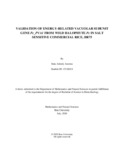| dc.contributor.advisor | Seraj, Zeba Islam | |
| dc.contributor.advisor | Sunfi, Tabassum Rahman | |
| dc.contributor.author | Anonna, Eera Ashrafy | |
| dc.date.accessioned | 2021-03-14T05:31:31Z | |
| dc.date.available | 2021-03-14T05:31:31Z | |
| dc.date.copyright | 2020 | |
| dc.date.issued | 2020-07 | |
| dc.identifier.other | ID: 15136014 | |
| dc.identifier.uri | http://hdl.handle.net/10361/14339 | |
| dc.description | This thesis is submitted in partial fulfilment of the requirements for the degree of Bachelor of Science in Biotechnology 2020. | en_US |
| dc.description | Catalogued from PDF version of thesis. | |
| dc.description | Includes bibliographical references (pages 36-40). | |
| dc.description.abstract | The study was conducted on transgenic rice, BR75, a high-yielding but salt-sensitive genotype
previously transformed with the Pc_PVA1 gene, at the Plant biotechnology Laboratory of Dhaka
University. The aim was to identify presence of the transgene and to assess the response of
transgenic seedlings to salt stress. The transgene originated from wild halophytic rice Porteresia
coarctata, endemic to coastal Bangladesh and was expected to confer salt tolerance to the
transformed sensitive rice, BR75. The wild type or untransformed BR75 and the two transgenic
genotypes derived from its transformation, P-46-1 and P-9-4 were used for this experiment.
DNA was extracted from the wild type and T1 generation of the transgenic plants. PCR analysis
followed by gel electrophoresis was performed with the isolated DNA. Then the performance of
transgenic BR75 T2 population in saline condition was investigated. Seedling screening was
done following the standard evaluation system (IRRI), and the chlorophyll content of the
seedlings were also measured. The results of the validation study were found to be positive, that
is to confirm their tolerance status as opposed to the wild type. The two transgenic varieties in
this study performed much better than the wild type BR75 in saline condition because these had
higher survival rate and chlorophyll content. The present study was conducted with a small
subset of the T2 population. In future, more tests like the leaf disk senescence assay,
determination of Na:K ratio under saline stress, mRNA analysis needs to be done for a more
detailed evaluation. Finally, the transgenic plants should be trialed in the natural saline
environment using standard Biosafety Protocols. | en_US |
| dc.description.statementofresponsibility | Eera Ashrafy Anonna | |
| dc.format.extent | 42 pages | |
| dc.language.iso | en_US | en_US |
| dc.publisher | Brac University | en_US |
| dc.rights | Brac University theses are protected by copyright. They may be viewed from this source for any purpose, but reproduction or distribution in any format is prohibited without written permission. | |
| dc.subject | Transgenic rice | en_US |
| dc.subject | BR 75 | en_US |
| dc.subject | Pc_PVA1 gene | en_US |
| dc.title | Validation of energy-related vacuolar subunit gene Pc_PVA1 from wild halophyte Pc in salt sensitive commercial rice, BR75 | en_US |
| dc.type | Thesis | en_US |
| dc.contributor.department | Department of Mathematics and Natural Sciences, Brac University | |
| dc.description.degree | B. Biotechnology | |

